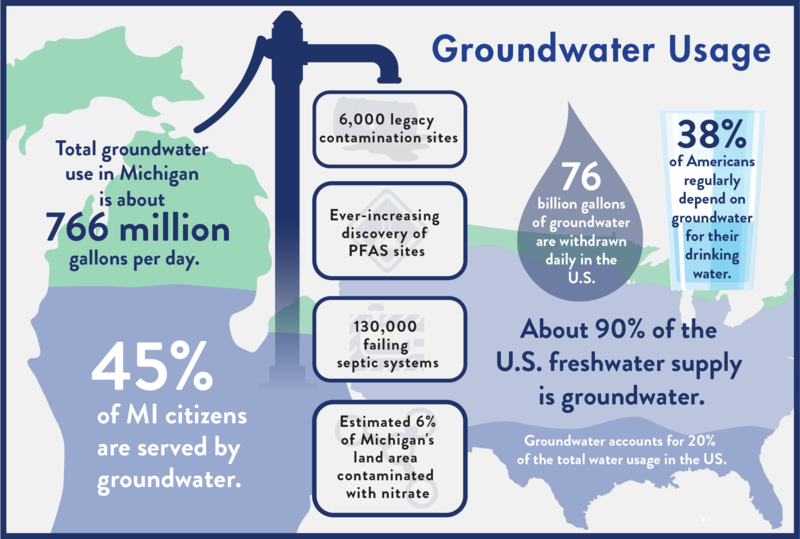Michigan’s groundwater is being severely mistreated, according to a report released this last month. Titled “The Sixth Great Lake: The Emergency Threatening Michigan’s Overlooked Groundwater Resource” it was published by the Traverse City-based non-profit For Love of Water, or FLOW. The piece details how pollution of the “sixth Great Lake” has taken place for over a century, resulting in many negative consequences for human health. Additionally, it states that Michigan laws have consistently failed its citizens and the situation has become more dire as the number of contamination sites grows.
The report emphasizes that regulations for groundwater are much looser than water at different stages of the hydrologic cycle. It is not visible, resulting in the reality that when most people think of water they do not take groundwater into account. This is even true at a federal level, as the Clean Water Act does not apply to groundwater, preventing the EPA from setting standards.
However, just because it is out of sight does not mean it should be out of mind. Dave Dempsey, a senior policy author for FLOW and co-author of the report, highlighted the importance of Michigan’s groundwater in an interview with Michigan Radio saying, “Forty-five percent of the population of the state of Michigan drinks groundwater,” said Dempsey. “And that’s not just from individual wells. But there are a lot of those. There’s over a million individual wells in the state from groundwater. But many communities also rely on groundwater for their drinking water source.” This is in addition to the fact that groundwater contamination can spread to surface water, a source of over half the population’s drinking water. Therefore groundwater quality impacts even Michiganders who do not directly rely on it for drinking.
Three main sources of contamination were identified throughout the report: septic systems, perfluoroalkyl & polyfluoroalkyl substances, or PFAS, and nitrate contamination from agricultural practices. Septic systems are water treatment systems that are not connected to a municipal sewer system. They rely on water being filtered by seeping through gravel and soil. Unfortunately, 87% of Michigan soils are not effective for this type of drainage. Both of these factors results in contaminants seeping into groundwater. PFAS are included in these potential contaminents, and may have serious health implications. As stated by the CDC, “potential for health effects from PFAS in humans is not well understood … in general, animal studies have found that animals exposed to PFAS at high levels resulted in changes in the function of the liver, thyroid, pancreas and hormone levels.”
Nitrate contamination is another specific concern with negative impacts on human health. It arises both from farm fertilizers and livestock operations, as well as failing septic systems. When ingested, nitrate is known to cause methemoglobinemia, a blood disorder that affects primarily infants and can be fatal.
The report concludes with many recommendations for Michigan as a state. Some aim to right past wrongs, such as allocating money to cleaning up sites of groundwater contamination, whereas some are proactive, like the calls for improved groundwater data collection and groundwater education. Many call on the governor and legislature to take action to protect Michigan’s valued water resources.


